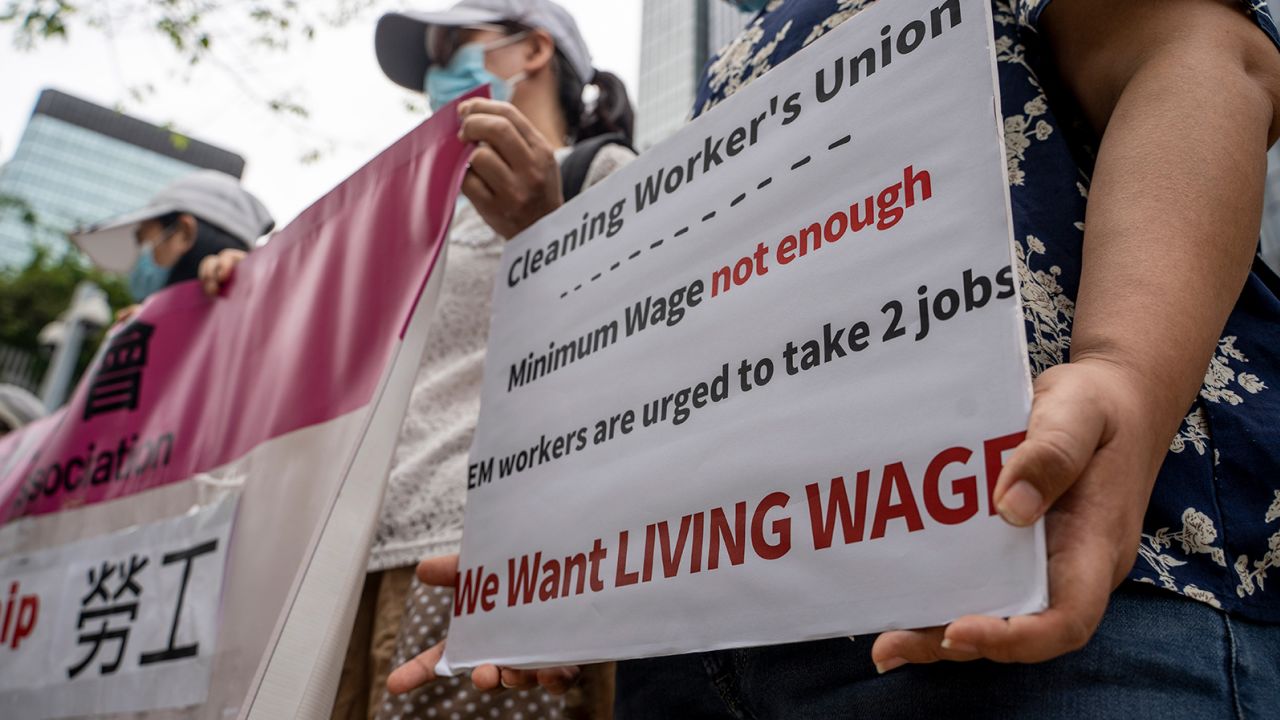Imagine working a full-time, nine-to-six job but still not being able to afford your basic expenses. This is the reality for many low-wage workers, not just in Hong Kong but also in many developed countries worldwide. Hong Kong, an impressively developed territory with the world’s fourth-highest Human Development Index, (a measurement encompassing healthy lifespans, education, and standard of living), is a major financial center and a hub for international trade and commerce thanks to its low taxation and free port trade. Additionally, Hong Kong has a highly developed infrastructure, including a world-class transportation system and modern facilities for business and leisure. However, there are many areas for improvement, particularly in sectors such as income inequality and poverty. According to the annual Poverty Situation Report for 2020, one-fifth of Hongkongers, around 1 million people, currently live in poverty. The city’s present minimum wage of HK$40 per hour is simply not enough to live on, especially in a city with such a high cost of living. Since the Statutory Minimum Wage has come into force on 1 May 2011, many people have been calling for it to be increased further in order tobenefit around 100,000 of Hong Kong’s lowest-paid workers. In my opinion, Hong Kong’s minimum wage should be increased because it would help reduce poverty and inequality, it would boost the economy, and paying higher wages would benefit individual businesses.
First of all, increasing the minimum wage in Hong Kong would help to reduce poverty and inequality. The current minimum wage is not enough to lift people out of poverty, leaving many low-wage workers struggling to make ends meet. According to Numbeo, the world’s largest cost of living database, a single person’s estimated monthly costs in Hong Kong are around HK$8,500, excluding rent. If a worker were to work under the minimum wage Monday to Friday from 9 am to 6 pm every week, they would only earn no more than HK$7,200 each month. This is not enough to cover all the basic expenses such as rent, food, and transportation. A report by the Hong Kong Council of Social Service also found that one of the main causes of poverty in Hong Kong was low wages. When people are poor, they are less likely to be able to participate in the economy, afford to buy goods, and save for the future. This can lead to a vicious cycle of poverty that is difficult to break. A higher minimum wage would help to lift these people out of poverty and give them a better chance to achieve a decent standard of living. Moreover, according to the Hong Kong Census and Statistics Department, the median monthly household income in 2022 is HK$28,000. This means that low-wage workers are earning less than one-third of what the average household is earning, which worsens the gap in income inequality. Hong Kong’s Gini Index (a measure of income inequality on a scale of 0 for perfect equality to 1 for total inequality) of 0.539 already ranks the 9th highest in the world and 1st in the developed world, indicating severe income inequality. Therefore, increasing the minimum wage in Hong Kong would help break the low-wage workers’ cycle of poverty and improve income inequality in the city.
Second of all, minimum wages for workers in Hong Kong should be increased because doing so can significantly boost the economy. According to a study conducted by the Hong Kong Trade Development Council, services sectors account for 93 percent of the Hong Kong GDP in 2020, indicating the economy’s highly dependency on consumer spending. More money in people’s pockets means they can spend more on the goods and services that keep the economy thriving. A study by the Economic Policy Research Centre found that a 10 percent increase in the minimum wage would in turn lead to a 0.5 percent increase in employment. This is mainly because these workers would have more disposable income to spend on goods and services, which would in turn create a ripple effect throughout the economy, increasing consumer demand and stimulating economic growth. Furthermore, raising the minimum wage would reduce the amount of money taxpayers spend on the public assistance that low-income families need It is estimated that nearly 70 percent of minimum wage workers’ families, around 133,000 families, are enrolled in at least one social security program in Hong Kong, costing the public up to HK$16 billion every year. On the contrary, if corporations and businesses were to pay higher wages to their workers, their families would be able to meet their daily expenses without the need for government financial assistance. According to a YouTube video entitled “Robert Reich Destroys Minimum Wage Myths,” from the American economist who served as the Secretary of Labor under President Bill Clinton and is currently a professor of public policy at the University of California, Berkeley, “[people’s] tax dollars are subsidizing corporations that don’t pay a living wage.” Hence, the minimum wage in Hong Kong should be increased in order to boost the economy.
Third of all, increasing minimum wages can benefit businesses because it can lead to higher productivity in the labor force. Higher wages motivate employees to work harder. Janet Yellen, the current United States Secretary of the Treasury, suggested in an article published in 1984 that higher wages create the conditions for workers to be more productive, pointing to “reduced shirking by employees due to a higher cost of job loss; lower turnover; an improvement in the average quality of job applicants.” That observation continues to ring true today. Researchers from the University of California, Berkeley, surveyed employers at the San Francisco Airport in 2003 after a broad-based increase in wages and found that the employers of the majority of affected workers reported that their overall performance had improved. Without a doubt, higher wages attract more motivated, more capable, more productive, and higher-quality workers. Additionally, higher wages lead to lower turnover, reducing the costs of hiring and training new workers. The same research on San Francisco Airport calculated that typical turnover costs exceed US$4,000 for each worker and that an increase in wages at the airport led to a decline in turnover of 34 percent, yielding turnover-related savings of US$6.6 million per year. In addition, higher wages at the airport led to shorter lines, demonstrating that workers who are less concerned about income security perform better. Therefore, increasing minimum wages will benefit businesses by boosting their workers’ productivity and motivation, thereby leading to more profit and less loss.
Opponents of increasing minimum wages may argue that, in order to do so, businesses may have to cut employees’ hours or cut jobs altogether, therefore leading to widespread unemployment. However, this is simply not the case. An abundance of research shows that increases in the minimum wage do not reduce the overall number of jobs. Researchers including various professors from different world-renowned universities examined 138 state-level minimum wage increases in the United States in January 2019. They found that the number of low-wage jobs remained unchanged in the five years following the increase, while workers were paid more. That arguably constitutes a job upgrade, not a job loss. The same scenario can likely be applied to any other place in the world, including Hong Kong. Some may also argue that if wages are raised, prices will skyrocket and lead to widespread inflation. This speculation is utterly baseless as well. The same research has found that for every 10 percent increase in the minimum wage, prices increase by less than half a percent — and it is only a temporary price increase that occurs in the month the wage hike goes into effect. In fact, the minimum wage needs to be raised in order to keep up with inflation. The minimum wage was originally set at HK$28 per hour in 2011 and was increased several times since then, but it has not kept up with inflation. The consumer price index in Hong Kong has increased by an average of 2.2 percent per year since 2011, while the minimum wage has only increased by an average of 1.5 percent per year. This means that the purchasing power of the minimum wage has declined in recent years. This decline has had a significant impact on low-income workers in Hong Kong, with many of them struggling to make ends meet. Therefore, Hong Kong’s minimum wage should be increased because the benefits of doing so completely outweigh the disadvantages.
In conclusion, Hong Kong’s minimum wage should be increased because it would help reduce poverty and inequality, it would boost the economy, and higher wages would benefit businesses. The current minimum wage is not enough to live on, and it has not kept up with inflation. Increasing the minimum wage would help to ensure that all workers are paid a fair wage and have the opportunity to escape poverty. The government has a responsibility to protect the rights of all workers, and increasing the minimum wage is one way to do so. It is time for the government to take action and ensure that all workers in Hong Kong are paid a fair wage.
 BlogPost
BlogPost